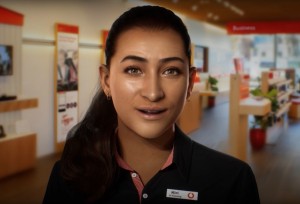Vodafone: leveraging Machine Learning in an (almost) 5G world

Vodafone's ability to deploy more predictive analytics given its access to large, global, and varied data pools will be a key competitive advantage as we approach a 5G world.
Machine learning is one of the latest megatrends impacting industries worldwide, driven by the availability of large amounts of data, better algorithms, and increasingly more powerful computers[1]. Vodafone Group plc, with 313MM customers across networks in 25 countries, is uniquely positioned to leverage the large amounts of data at its disposal, including individual traffic patterns, app usage, and IoT data, to deploy machine learning across its Consumer (Mobile, Fixed broadband, TV, voice) and Enterprise (Carrier, Cloud, IoT) segments[2]. YoY declines in revenues, from €49.8B in 2016 to €46.4B in 2018, evidence challenges the company is currently facing in the industry, and Big Data and predictive analytics are a key strategic focus to drive improved financial performance[2]. Competition is fierce, with cloud technology further blurring the line between Telecommunications players and Technology companies. Telecommunication companies are also on a race to leverage 5G, big data and AI to offer better, faster service to clients.
On the Consumer side, Vodafone subsidiaries have primarily focused on deploying Big Data and predictive analytics to create better products/plans, personalize marketing, and enhance customer service[3]. According to David Gonzalez Martinez, Head of Big Data and AI at Vodafone Group Enterprise, customized recommendations have been launched in 15 markets, enhancing cross-sell and customer service, increasing revenues and reducing churn[2,3]. For instance, Vodafone India is leveraging AI and Big Data to design and recommend better suited products and services based on both aggregate and individual prior consumption behavior[4]. The company has also launched an AI chatbot named TOBi, designed to handle a wide range of customer queries in order provide a more seamless customer service. TOBi has seen early success; conversion rates are +100% compared to its website, with lower transaction times and abandonment rates [5,6]. Vodafone also partnered with FaceMe to launch Kiri in New Zealand, the first Telco Digital Human, who is designed to carry out basic transactions in-store to free up sales representatives for more complex customer needs. Kiri can handle verbal interactions and is capable of reading and responding to human emotions[7]. Vodafone plans to first pilot Kiri in a couple stores in New Zealand, with the potential for worldwide roll-out, enhancing customer service and reducing costs due to a smaller required workforce.

Furthermore, Vodafone is conducting machine learning tests in Germany and Ireland in C-SONs (Centralized Self-operating Networks) to improve the speed and connectivity of its networks. Initial tests have been promising; network optimization has increased by 45,000%, with an average 6% improvement in mobile download speed and savings of about 2.5 months in manual engineering labor[8]. The company expects to deploy this new technology commercially in 2019. While reducing cost reduction and improving service in the short-term, the ability of the network to self-optimize also has medium-term implications as the company moves to 5G.
On the Enterprise side, Vodafone takes advantage of its massive data on customer movement, app usage, and page visits to better service its Enterprise Customers. According to David Gonzalez Martinez, Vodafone Enterprise clients can leverage Vodafone’s data and machine learning algorithms to improve their own companies. Retailers, for instance, can use Vodafone customer traffic data when deciding the best location to open a store. Governments can improve public transportation as it gets a better sense of peak transit times and routes[3]. Medium term applications of machine learning for Vodafone’s Enterprise customers are also quite large when considering the expected launch of 5G in the next year. 5G can process even larger amounts of data more quickly, allowing Vodafone to better support clients across multiple industries – e.g. help accelerate autonomous car development, reduce manufacturing downtime, improve healthcare, and create smarter cities[9,10].
With 5G on the horizon, Vodafone has strong incentive to continue improving its machine learning capabilities. Currently, innovation seems to occur primarily in-house at a local level (for instance, Vodafone Germany conducting C-SON tests) and with external partners, supported by some M&A activity. Vodafone should consider whether a more centralized approach would speed the rate of innovation across the organization. I would also recommend Vodafone consider whether it can further accelerate innovations via investments or more acquisitions of early stage start-ups. Additionally, Vodafone has maintained a strict customer privacy policy[8], using aggregate rather than individual customer data to provide insights to Enterprise clients. Considering an “opt-in” approach to utilize individual-level data could allow the company to better service both individual and enterprise clients by facilitating deeper connections between the two. Should Vodafone take advantage of individualized data to enhance its Enterprise product offerings or is there too much sensitivity given prior customer protection violations? Given strong competition in telecommunications, its access to data, and Vodafone’s in-house 5G and machine learning capabilities, should they consider expanding into other industries? If so, what industries?
Word Count: 793
Sources
[1] Brynjolfsson and A. McAfee. What’s driving the machine learning explosion? Harvard Business Review Digital Articles (July 18, 2017). Accessed November 8, 2018.
[2] Vodafone Group Plc. Annual Report 2018. https://www.vodafone.com/content/annualreport/annual_report18/downloads/Vodafone-full-annual-report-2018.pdf (July 2018). Accessed November 8, 2018.
[3] Gonzalez Martinez, David. Telephone interview. November 8, 2018.
[4] Abbas, M.. Vodafone India leverages artificial intelligence and big data. The Economic Times Retrieved from http://search.proquest.com.ezp-prod1.hul.harvard.edu/docview/2042496758?accountid=11311 (May 17, 2018). Accessed November 12, 2018.
[5] Vodafone to use artificial intelligence to speed up online queries. M2 Presswire Retrieved from http://search.proquest.com.ezp-prod1.hul.harvard.edu/docview/1886648629?accountid=11311 (April 12, 2017). Accessed November 12, 2018.
[6] Davis, Ben. Vodafone’s chatbot is delivering twice the conversion rate of its website. Econsultancy. https://econsultancy.com/vodafones-chatbot-is-delivering-twice-the-conversion-rate-of-its-website/ (October 11, 2018). Accessed November 8, 2018
[7] Mack, B. Meet Kiri, Vodafone’s new digital human. https://global-factiva-com.prd2.ezproxy-prod.hbs.edu/redir/default.aspx?P=sa&NS=16&AID=9HAR000400&an=COMSMEA020181103eeav00001&cat=a&ep=ASI (October 31, 2018). Accessed November 8, 2018.
[8] Tenorio, Santiago. AI enabled augmented engineering increases network optimisation speed by over 45,000%. Vodafone Group. https://www.vodafone.com/content/index/what/technology-blog/ai-enabled-augmented-engineering-increases-network-optimisation-.html (September 26, 2017). Accessed November 8, 2018.
[9] Krigsman, Michael. Vodafone exec talks 5G, autonomous vehicles, virtual surgery, security, and more. ZDnet. https://www.zdnet.com/article/vodaphone-exec-talks-5g-autonomous-vehicles-virtual-surgery-security-and-more/ (October 29, 2018). Accessed November 8, 2018.
[10] Telcos and automakers increase connected car trials, partnerships. Mobile Europe. https://www.mobileeurope.co.uk/press-wire/telcos-and-automakers-increase-connected-car-trials-partnerships (March 1, 2017). Accessed November 8, 2018.



Interesting article! I wonder how Vodafone’s management thinks about the future of the privacy debate regarding customer data and also wonder what percentage of customers would actually choose to opt into such a agreement unless it was somehow disguised from them in the types of shady agreements that these technology companies tend to foist upon users in an effort to collect data. It seems that aside from reducing costs and making in-store optimizations the true market potential that Vodafone has for its data is shopping out customer information to enterprise customers which may create a tension between the B2B side and B2C sides of their business as they look to reverse their revenue losses.
I enjoyed reading about this! It seems to me there is a large opportunity to expand the B2B market. The great part is that I don’t think this needs to be predicated on individual consumer data, as call patterns which can inform consumer activity can be used across many industries as companies look to roll out de novo location strategies. I think the question will be exactly how to package and monetize this – I think there are enough capabilities within their information now, but how they choose to roll out this platform could be tricky. I also wonder whether the cost-cutting strategy can offset some of their revenue losses as well when thinking about the bottom line.
Great article, thank you for sharing your perspective!
Totally agree, the lines are not only blurred between technology and telecommunications, but between big technology firms and virtually any industry. Companies in telecom still have an added value but must continue to innovate and adapt to the changing ecosystem.
Your article instigated the thought of, why is Vodafone not in the business of providing data storage and data centers? While technology companies are under scrutiny for data security, it seems like a viable opportunity for new players in that space.